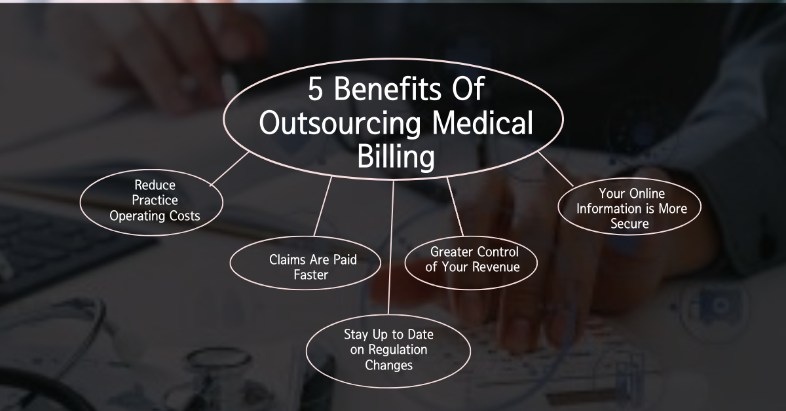In the fast-paced world of healthcare, hospitals are constantly seeking ways to streamline their operations and improve efficiency. One practice that many hospitals have adopted is outsourcing their billing services. This article explores the reasons behind this trend and delves into the benefits that hospitals can reap from outsourcing their billing processes. By entrusting this critical task to external experts, hospitals can reduce costs, increase revenue, and focus their resources on providing high-quality patient care.
Reasons for Hospital Billing Outsourcing
Reduces Cost and Improves Efficiency
Outsourcing hospital billing can significantly reduce costs and improve overall efficiency. By outsourcing, hospitals can eliminate the need for additional staff and resources dedicated to the billing process. The outsourcing partner can handle the complex tasks related to billing and coding, ensuring accuracy and timely submission of claims. This frees up the hospital’s staff to focus on core medical activities, ultimately leading to cost savings and improved operational efficiency.
Expertise and Specialization
Hospital billing outsourcing allows hospitals to benefit from the expertise and specialization of billing professionals. Billing companies have a team of skilled professionals who have extensive knowledge of the complex billing regulations and coding guidelines. They stay up-to-date with the latest changes in billing practices, ensuring accurate and compliant billing for the hospital. This level of expertise can be challenging and expensive to maintain in-house, making outsourcing an attractive option.
Access to Advanced Technology
Outsourcing hospital billing provides access to advanced technology and billing software that may be cost-prohibitive for hospitals to implement on their own. Billing companies invest in state-of-the-art technology that can streamline the entire billing process, from claim submission to payment posting. This technology not only improves the accuracy and efficiency of the billing process but also allows for better data management and analysis, leading to improved decision-making and financial performance.
Focus on Core Competencies
By outsourcing hospital billing, hospitals can redirect their focus and resources towards their core competencies, which is delivering quality healthcare. Billing and coding can be time-consuming and complex, requiring specialized knowledge. Outsourcing this function allows hospitals to concentrate on providing excellent patient care, while leaving the billing tasks to experts who can handle them efficiently. This strategic allocation of resources can lead to improved patient outcomes and strengthened overall performance for the hospital.
Allows for Scalability
Outsourcing hospital billing offers the flexibility and scalability that hospitals need to adapt to changing volumes of patients and billing requirements. During periods of increased patient load or when introducing new services, hospitals can quickly scale up their billing operations by engaging the outsourcing partner. This ensures that the hospital’s billing capacity matches its patient volume, preventing delays or backlogs in the billing process. Conversely, during slower periods, hospitals can scale down their billing operations, avoiding unnecessary costs.
Reduces Administrative Burden
Hospital billing can be a time-consuming and administrative-intensive process. By outsourcing this function, hospitals can alleviate the administrative burden on their staff. Billing companies handle all aspects of billing and follow-up, from verifying insurance coverage to submitting claims and processing payments. This enables hospital staff to focus on patient care and other critical administrative tasks, leading to increased productivity, reduced stress, and improved efficiency.
Better Compliance with Regulations
The healthcare industry is subject to numerous regulations and compliance requirements related to billing and coding. Outsourcing hospital billing to specialized companies ensures better compliance with these regulations. Billing companies have a comprehensive understanding of the complex billing rules and can ensure accurate coding and timely submission of claims, minimizing the risk of non-compliance and potential penalties or legal issues for the hospital.
Streamlined Revenue Cycle Management
Outsourcing hospital billing provides a streamlined approach to revenue cycle management. Billing companies have robust processes in place for every step of the revenue cycle, from patient registration to payment posting. They utilize advanced technologies, automation, and data analytics to optimize the revenue cycle, reducing billing errors, and improving reimbursement rates. This streamlined approach ensures that hospitals maximize their revenue potential and maintain a healthy financial position.
Improved Cash Flow
Efficient and timely billing is crucial for maintaining a steady cash flow in hospitals. Outsourcing hospital billing can significantly improve cash flow by ensuring prompt and accurate claim submission, diligent follow-up on unpaid claims, and timely collections. Billing companies have the expertise and resources to optimize the billing process and reduce delays in reimbursement. This enables hospitals to receive payments faster, improving their financial stability and ability to invest in patient care and infrastructure.
Better Patient Experience
Outsourcing hospital billing can contribute to a better overall patient experience. By streamlining the billing process and reducing errors or delays in claim submission, patients can enjoy a smoother billing process and receive accurate and timely bills. A seamless billing experience enhances patient satisfaction and trust in the hospital’s services. Additionally, by freeing up hospital staff to focus on patient care, hospitals can provide a more personalized and attentive experience for patients, further improving their overall satisfaction.
Challenges in Hospital Billing Management

Complex and Evolving Billing Regulations
One of the significant challenges in hospital billing management is the complex and continuously evolving nature of billing regulations. Hospitals need to stay updated on changes in regulatory requirements to ensure accurate coding and billing practices. Compliance with these regulations can be time-consuming and resource-intensive, requiring continuous training and education for billing staff. Failure to comply with the regulations can lead to denied claims, financial penalties, and potential legal repercussions.
Constant Changes in Billing Codes and Standards
Billing codes, such as the Current Procedural Terminology (CPT) codes and International Classification of Diseases (ICD) codes, are frequently updated, requiring hospitals to stay abreast of the changes. Keeping up with these changes and ensuring accurate coding can be a challenge for hospitals, particularly smaller healthcare facilities with limited resources. Incorrect or outdated codes can lead to claim denials, delayed reimbursement, and revenue loss for the hospital.
Staffing and Training Challenges
Maintaining a proficient and trained billing staff can be challenging for hospitals. Hiring and retaining experienced billing professionals with extensive knowledge of billing regulations and coding practices can be costly. Furthermore, ongoing training and keeping up with industry changes require significant time and investment. Hospitals may face staffing shortages, turnover, and knowledge gaps, which can hinder the efficiency and accuracy of the billing process.
Investment in Infrastructure and Technology
Effective hospital billing management requires investment in infrastructure and technology, including billing software, electronic health record systems, and secure networks. Implementing and maintaining these systems can be costly and resource-intensive for hospitals. Smaller healthcare facilities may face financial constraints or lack the expertise to manage the technological requirements. Outsourcing can provide access to advanced technology and infrastructure without the need for significant up-front investments.
Increasing Administrative Burden
The administrative burden of hospital billing management is increasing due to the complexity of billing processes and the growing number of payers. Billing staff must navigate multiple insurance plans, each with different billing requirements and protocols. Manually handling administrative tasks, such as insurance verification and claim submission, can be time-consuming and prone to errors. Hospitals may struggle to allocate sufficient resources and staff to manage the administrative demands of billing effectively.
Limited Capacity for Revenue Cycle Management
Effective revenue cycle management requires comprehensive processes, timely follow-up, and detailed analytics. However, hospitals may have limited capacity to handle these complex tasks internally. A lack of dedicated resources and expertise in revenue cycle management can lead to missed revenue opportunities, increased denial rates, and compromised financial performance for the hospital. Outsourcing can provide access to specialized resources and dedicated expertise in revenue cycle management, enabling hospitals to optimize their financial operations.
Factors Considered Before Outsourcing Billing

Cost Analysis
Before outsourcing hospital billing, hospitals should conduct a cost analysis to determine the potential financial impact. This analysis should include an assessment of the current cost of in-house billing operations, including staff salaries, benefits, technology expenses, and training costs. Hospitals should compare these costs with the pricing models offered by billing vendors, considering both the short-term and long-term financial implications of outsourcing. The cost analysis should also consider the potential benefits gained from improved efficiency, reduced errors, and increased reimbursements.
Vendor Experience and Expertise
When considering outsourcing hospital billing, hospitals should evaluate the experience and expertise of potential vendors. It is essential to choose a vendor with a proven track record in hospital billing and a deep understanding of the complex healthcare billing landscape. Hospitals should assess the vendor’s experience in working with similar-sized healthcare facilities and their ability to address specific billing challenges. Checking references, reading case studies, and conducting site visits can provide insight into the vendor’s expertise and competence.
Integration with Existing Systems
Seamless integration with the hospital’s existing systems is crucial when outsourcing hospital billing. The vendor should have the capability to integrate with the hospital’s electronic health record systems, practice management systems, and other relevant software platforms. The ability to exchange data securely and efficiently is essential to ensure the continuity and accuracy of the billing process. Hospitals should assess the vendor’s integration capabilities and explore the potential challenges and requirements for system integration before making a decision.
Data Security and Confidentiality Measures
Outsourcing hospital billing involves the exchange of sensitive patient information, making data security and confidentiality paramount. Hospitals should carefully evaluate the vendor’s data security measures, including encryption protocols, access controls, and compliance with health information privacy laws such as the Health Insurance Portability and Accountability Act (HIPAA). Vendors should have robust data protection policies and procedures in place, supported by regular security audits and disaster recovery plans. Contracts should also include provisions for data protection, confidentiality, and breach notification protocols.
Contractual Terms and Service Level Agreements
Before entering into an outsourcing agreement, hospitals should carefully review the contractual terms and service level agreements (SLAs). The contract should clearly outline the scope of services to be provided, performance expectations, payment terms, dispute resolution mechanisms, and termination clauses. SLAs should define key performance indicators (KPIs), such as claim submission accuracy, reimbursement rates, and response times. Hospitals should ensure that the SLAs align with their specific needs and goals, providing a framework for measuring the vendor’s performance and accountability.
Steps involved in Outsourcing Hospital Billing

Assessment of Current Billing Process and Needs
The first step in outsourcing hospital billing is conducting an assessment of the current billing process and identifying the specific needs and challenges. This assessment includes evaluating the current staffing, technology, workflows, and systems in place. It also involves analyzing the hospital’s billing performance, such as claim submission accuracy, reimbursement rates, and average payment times. This assessment provides a baseline for determining the scope of outsourcing and sets the foundation for selecting an appropriate vendor.
Identification and Evaluation of Potential Vendors
Once the hospital’s billing needs are clearly defined, the next step is to identify potential vendors that align with those needs. Hospital administrators can research and seek recommendations from industry peers, attend vendor showcases, and utilize online platforms specializing in healthcare outsourcing. A comprehensive evaluation of potential vendors should include assessing their experience, expertise, reputation, technology capabilities, and financial stability. Requesting and reviewing case studies, client testimonials, and evaluating the vendor’s track record in meeting SLAs are essential in this process.
Request for Proposals (RFP)
After identifying a shortlist of potential vendors, hospitals can issue a Request for Proposals (RFP) to gather detailed information about their services and pricing models. The RFP should include specific requirements, timelines, and evaluation criteria. Vendors should be given sufficient time to respond, and their proposals should provide a comprehensive understanding of how they plan to address the hospital’s billing needs. Evaluating and comparing the proposals helps hospitals narrow down their options and identify vendors whose offerings align most closely with their requirements.
Vendor Selection and Negotiation
Following the evaluation of proposals, hospitals can select the preferred vendor or vendors for further negotiations. Negotiations should focus on contractual terms, pricing models, SLAs, data security measures, and any other critical aspects. Hospitals should ensure that the vendor’s obligations, performance expectations, and accountability are clearly defined in the contract. Open and transparent communication during negotiations will help establish a mutually beneficial relationship that aligns with the hospital’s goals and expectations.
Transition and Implementation
Once the contract is finalized, the hospital and the vendor can begin the transition and implementation process. This phase involves data migration, system integration, training of hospital staff, and the establishment of communication channels and escalation protocols. It is crucial to develop a detailed transition plan that outlines the timelines, responsibilities, and checkpoints to ensure a smooth transition. Regular communication and collaboration between the hospital and the vendor are essential to address any implementation challenges or issues promptly.
Ongoing Monitoring and Performance Evaluation
After the transition and implementation phase, hospitals should establish mechanisms to monitor the performance of the outsourcing vendor continually. This includes regular review of performance metrics and KPIs defined in the SLAs, such as claim accuracy rates, denial rates, and payment turnaround times. The hospital’s billing team should maintain open communication with the vendor, discuss any concerns or areas for improvement, and work collaboratively to address performance gaps. Regular performance evaluations help ensure ongoing quality and accountability in the outsourcing partnership.
Successful Hospital Billing Outsourcing Strategies

Clear Communication and Expectation Setting
Successful hospital billing outsourcing requires clear communication and expectation setting between the hospital and the vendor. Both parties should have a shared understanding of the goals, timelines, roles, and responsibilities. Regular meetings, conference calls, and written communication channels facilitate effective collaboration and problem-solving. Hospitals should clearly communicate their expectations regarding performance, reporting, and compliance, while the vendor should be transparent about their capabilities, limitations, and proposed solutions.
Strong Vendor Relationship Management
Maintaining a strong and productive relationship with the outsourcing vendor is crucial for long-term success. Hospitals should designate a dedicated relationship manager or team to oversee the outsourcing partnership. This relationship manager acts as the main point of contact, streamlining communication, addressing concerns, and ensuring that the vendor’s performance aligns with the hospital’s expectations. Regular meetings, performance reviews, and collaborative problem-solving foster a mutually beneficial relationship built on trust, transparency, and mutual respect.
Regular Reporting and Performance Metrics
Regular reporting and performance monitoring are essential in evaluating the success of hospital billing outsourcing. The vendor should provide comprehensive reports on key performance metrics, such as claim submission accuracy, denial rates, reimbursement rates, and average payment times. These reports enable hospitals to track the progress, identify trends, and address any performance gaps promptly. Regularly reviewing performance metrics facilitates data-driven decision-making and fosters a culture of continuous improvement.
Continuous Process Improvement
Hospital billing outsourcing should be viewed as an opportunity for continuous process improvement. Both the hospital and the vendor should engage in regular process reviews and identify areas where efficiencies can be further enhanced. Continuous training and education for both the hospital’s billing staff and the vendor’s team can promote ongoing improvement in billing practices. By embracing a culture of continuous learning and process optimization, hospitals can maximize the benefits gained from outsourcing and achieve better financial outcomes.
Adaptability to Regulatory Changes
The healthcare billing landscape is constantly evolving, with new regulations, payer requirements, and coding updates being introduced regularly. Successful hospital billing outsourcing strategies incorporate adaptability to these regulatory changes. Vendors should demonstrate a proactive approach to staying up-to-date with industry changes, providing timely updates and recommendations to ensure compliance and minimize the risk of claim denials. Regular communication between the hospital and the vendor is essential to address any regulatory changes promptly and implement necessary adjustments to billing processes.
Patient-Centric Approach
Hospital billing outsourcing strategies should always prioritize a patient-centric approach. Billing processes should be designed with the patient experience in mind, ensuring clear and concise billing statements, transparent communication about costs, and support for any billing inquiries or concerns. The outsourcing vendor should have protocols in place for assisting patients with insurance-related questions, resolving disputes, and providing financial counseling when needed. A patient-centric approach to billing fosters trust, satisfaction, and loyalty, ultimately benefiting both the hospital and the patients.
Collaboration between Hospital Staff and Billing Vendor
Successful hospital billing outsourcing requires a collaborative approach between the hospital’s staff and the billing vendor. This collaboration involves regular communication, knowledge sharing, and joint problem-solving. Hospital staff should actively engage with the vendor to provide insights into specific patient needs, coding requirements, and any unique billing challenges. The vendor, in turn, should engage with the hospital’s staff to gain a comprehensive understanding of the hospital’s operations and tailor their services accordingly. Collaboration strengthens the partnership and ensures that the outsourcing arrangement remains aligned with the hospital’s goals and core values.
In conclusion, outsourcing hospital billing offers numerous benefits, including cost reduction, improved efficiency, access to expertise and advanced technology, and better compliance with regulations. It allows hospitals to focus on their core competencies, enhances scalability, reduces administrative burdens, and improves the overall patient experience. However, there are challenges in hospital billing management, such as complex billing regulations, constant changes in billing codes, staffing and training issues, investment in infrastructure, and increasing administrative burdens. Factors to consider before outsourcing include cost analysis, vendor experience and expertise, integration with existing systems, data security, and contractual terms. The steps involved in outsourcing hospital billing include assessing current processes, evaluating potential vendors, issuing an RFP, selecting a vendor, transitioning, and ongoing monitoring. Successful hospital billing outsourcing strategies prioritize clear communication, a strong vendor relationship, regular reporting, continuous process improvement, adaptability to regulatory changes, a patient-centric approach, and collaboration between hospital staff and the billing vendor. By carefully considering these factors and implementing effective strategies, hospitals can optimize their billing operations, improve financial performance, and focus on delivering high-quality patient care.
